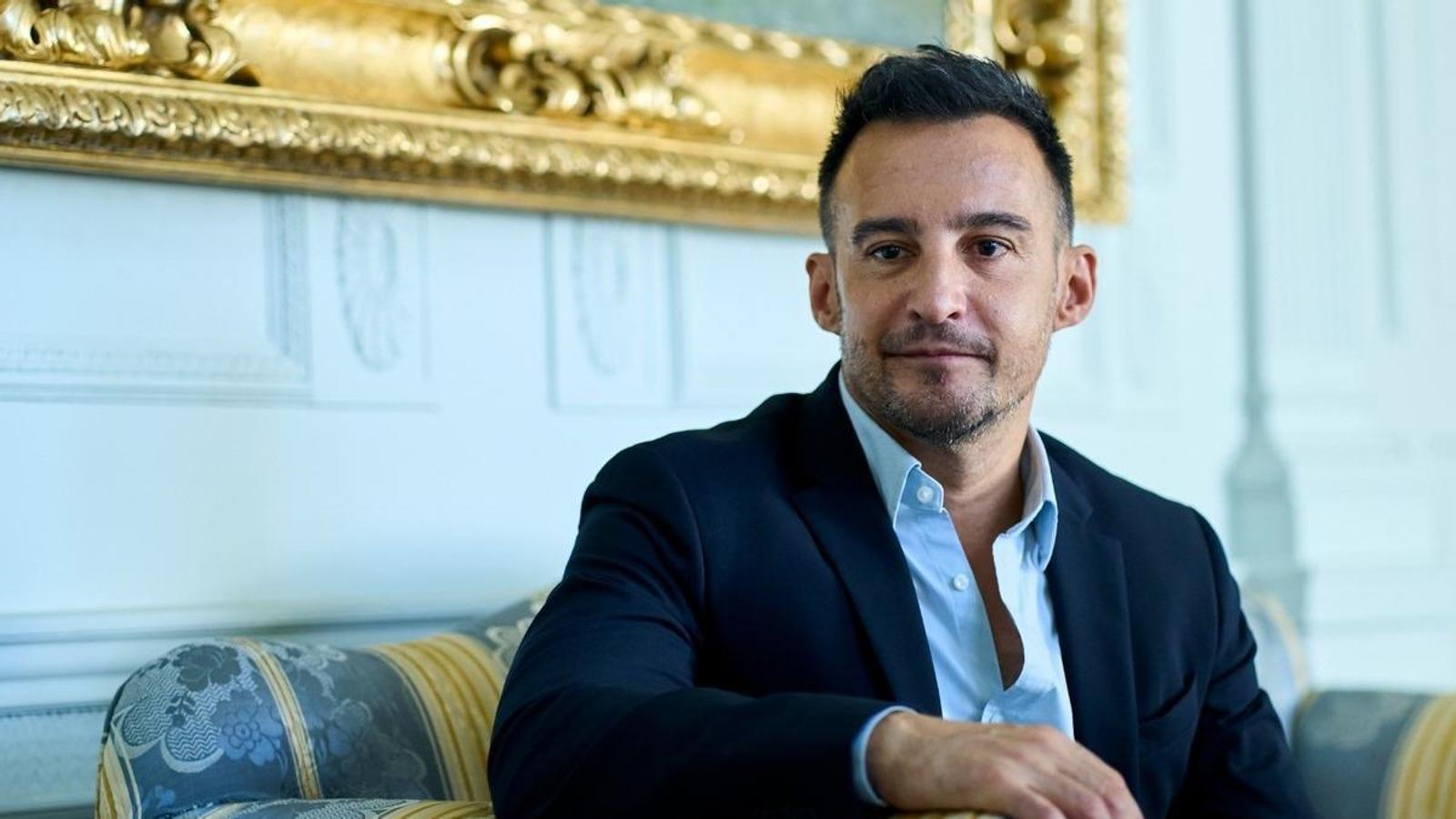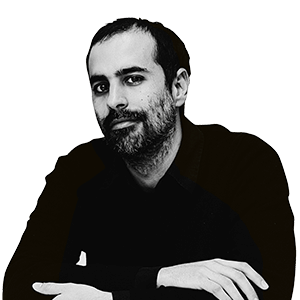Alejandro Amenábar: “I came out as gay so the press would stop asking me about my ideal girl.”
Filmmaker, premiere of 'The Captive'


BarcelonaAfter the bankruptcy miniseries FortuneAlejandro Amenábar (Santiago de Chile, 1972) returns to the cinema with a fiction that recreates Miguel de Cervantes' five years of captivity in Algiers. But The captive, just released in theaters, draws on both historical sources and Amenábar's imagination, who inscribes the story within the prison adventure genre without missing the opportunity to offer his personal vision of the origins of Cervantes' literary and creative impulse.
What led you to become interested in the figure of Cervantes?
— I must confess that I have never been a Cervantes scholar. I knew him from what we all learn in school: the major milestones of his life and some text commentary on fragments of his work.He QuixoteYes, I do remember reading Rinconete and Cortadillo and some other work, but it wasn't even finished Don QuixoteBut eight years ago, my producer told me about this period of captivity with the idea of turning it into an adventure project, because everything that happened to him was a series of adventures, and some of them were quite incredible. And when I started delving into books and documentation, I realized it's a fundamental period for understanding the artist and the human being, because it's when they are forged as people. And then they begin to write as if their life depended on it. The project reached another dimension and ended up being the most autobiographical thing I've ever done: however remote in space and time it may be, let's talk about a storyteller, and I can identify with that.
I understand that you are not comparing yourself to him.
— No, not at all. But both he and I, and so many storytellers, seek to communicate through our works. In this case, we're talking about one of the greatest storytellers in history, and this was the challenge and risk of the project, because we wanted to pay homage to his work so that, in some way, it would be connected to his masterpiece.
The plot of the film also draws on Arabian Nights: Cervantes is a kind of Scheherazade who invents stories to entertain the Pasha of Algiers and thus save his life.
— In the first part of'Don Quixote' There are a couple of chapters that tell the story of the captive, a story that Cervantes is believed to have written or conceived before Don Quixote and it has many autobiographical elements. And both my co-writer, Alejandro Hernández, and I thought that the ability to tell stories like that of the captive was the way to connect the character with his art.
One of the most talked-about aspects of your approach to the character is portraying him as a bisexual man. What clues lead you to imagine him that way?
— Rather than talking about whether he was bisexual, I'd like to clarify that these kinds of comments we make about each other ultimately come from the 20th century, when people began to be classified by their sexual behavior as heterosexual, homosexual, etc. But the reality we see right now on the street possibly also existed behind closed doors in the 16th century, and it's much more complex and fluid. Rather than talking about homosexual or bisexual, I wanted to talk about an affinity between Cervantes and his captor, the Paján of Algiers, something that appears as a hypothesis in many history books; I didn't just make it up. And I thought it would be interesting to explore it dramatically.
I was aware that it would cause a certain stir.
— Yes, but it's still astonishing that in the 21st century, it's a scandal for a man to have a relationship with another man. And this fact, which is far from proven, wouldn't clarify whether Cervantes was homosexual, because sexual reality is more complex. Furthermore, I wasn't just interested in sexual affinity, but in intellectual affinity, in the communication between two men with common elements. Both were imprisoned, both were offered the possibility of converting and prospering in the Muslim world. And we know that Hassan Paixà was a highly educated person who spoke several languages. The play required me to develop and reinvent the story of these two men.
The suspicion and attraction between these men can also be read as a metaphor for the relationship between the Christian and Arab worlds. Was this a theme you wanted to explore?
— Yes, but above all through Cervantes' relationship with 16th-century Algiers, which was a much more open society than Castile at that time, and infinitely more open than Algeria today in terms of sexual permissiveness. For a 16th-century Christian, walking the streets of Algiers must have been a truly unique experience. And this is where the theme of tolerance and the relativism of what we understand by morality really comes into play.
From Deep sea and AgoraYour films have been very combative against moral rigidity and ideological fanaticism. Are you concerned about the rise of the far right?
— But I'm worried about the world's direction. Who isn't? With everything that's happening in Gaza and Ukraine... The constant feeling is that history doesn't repeat itself, but it does rhyme. I've felt this since I made Agora, a film that sensed a change of pace, and not necessarily for the better. Dogmas have always interested me, and I think I've fought them for as long as I can remember. When I was a student at a religious school and we studied the Bible, there were things that didn't fit. And not just miracles, but that vengeful, sectarian God of the Old Testament; there were many things that ran counter to my sense of humanity and logic. All of this somehow filters into my films. But I don't like the "combative" thing." What are you saying? I don't want to be combative. I'm firm in my positions, of course, and I defend them. But two forces coexist within me: I want to be able to talk about everything necessary, but I want to do so through films and the sacred bond they establish with viewers. The audience must understand me, and I don't want to overwhelm or offend them; I simply want to express my point of view. And cinema helps me do that through emotional means.
Something about that boy who questioned the Bible is in the film, isn't it? For example, in the portrayal of the hypocritical and mean-spirited priest played by Fernando Tejero.
— Blanco de Paz is a real character. Obviously, I wasn't there to know what he was like, but according to the chronicles, he was quite a troublemaker in prison and, of course, Cervantes's archenemy. His greatest literary enemy must have been Lope de Vega, and his personal enemy was Blanco de Paz. He's a dark figure, but at the same time a victim of his prejudices, a tormented man trapped in his own reality.
You came out as gay years ago, but until now you hadn't addressed the topic in your films. Was that a debt you owed yourself?
— The reason I haven't felt called to explore homosexuality in film before is the same reason I couldn't refuse to do so this time. Once I read the history books and essays and began to construct the plot, renouncing the homosexual element would have been like renouncing myself and being ashamed of my condition. If I hadn't previously expressed homosexuality artistically in my films and do so now, it's because the story demanded it.
So when you came out in two magazines twenty years ago, it wasn't an act of activism?
— When I came out as gay, it was basically so the press would stop asking me who my ideal woman was. I don't like to outline my personal life, but I don't like to lie blatantly either, so I decided it was the best way to handle it: just say it. But it's one thing to make a declaration of intent as a citizen, and another to express it in your films. My homosexuality hasn't caused me any trauma, nor has it been transcendental from an artistic point of view.
Next year will mark the 30th anniversary of ThesisDo you feel that it still represents you as a director?
— Yes, it was the sum of all the Hollywood cinema I'd devoured, a universe of mystery that ranged from Agatha Christie novels to the films I loved. I shook it all up and it exploded. It was the kind of cinema I wanted to make at the time, and it's a kind of cinema I've always felt very connected to. I'd love to make thrillers again, but what matters most is what I want to tell, and then I find the most appropriate genre. Telling Ramón Sanpedro's story in the horror genre wouldn't have made sense.
What do you think he would think about The captive Chema de Thesis, that film student played by Fele Martínez?
— Chema is directly inspired by a friend of mine from college whom I still see. He's always one of the first to read my film scripts, and he doesn't mince his words. In fact, in Thesis I dedicated myself to reproducing his dialogues in the script. And that friend of mine has seen The captive and he loved it.
Imagine one day you tell the story of how that film student who failed directing in college ends up becoming one of the most successful filmmakers of his generation. What would be the first scene of the story?
— I would probably start with my mother, who went to Chile in the midst of the post-war period and stayed there until, 15 days before the coup d'état, seeing that the situation in the country was very similar to that of the Second Spanish Republic, she convinced my father and he returned to Spain. In other words, my life is a round trip. And I don't know if the seed of my vocation lies in this trip, but it's clear that I'm a mixture, and that also drives me. The captive, because what allows us to understand the complexity of human beings is to come into contact with the enemy's culture. In my case, my mother experienced Chilean reality for twenty years, and then my father had to confront the reality of Madrid. The concept of mixture has always been present in my family, and it's what I champion in societies.
When I said before that he doesn't want to be "combative" I remembered that when he premiered While the war lasts He was accused of being equanimous and not taking a strong enough position. Perhaps it also has to do with the closeness he displays toward other people's ideas.
— It's my way of being. I'm not explosive; I'll always offer a hand to the person in front of me. I don't like to surround myself with people who always agree with my ideas; I like contrast. It's what Don Quixote and Sancho Panza do in both books: build bridges. There's no need to be in the middle. I consider myself a left-wing person, but I don't like to provoke. I like to think I can establish a connection with the person in front of me, and this is evident in my films.
What is your best movie-related memory?
— One of the most moving experiences I have ever had was Cine Paradiso, because it's a film in which I laughed and cried, and this collective experience of being in a packed theater with this wonderful music by Ennio Morricone and everyone crying and laughing, this is priceless, and it's the reason why I continue to advocate for cinema in theaters today.
